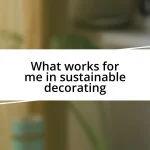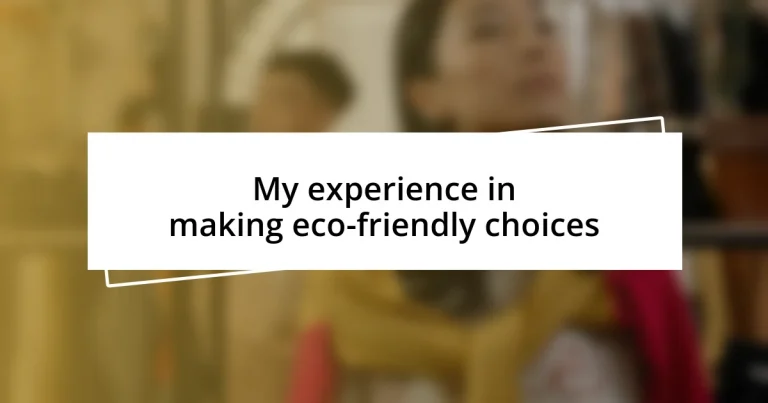Key takeaways:
- Embracing eco-friendly choices empowers individuals to make impactful decisions, like choosing reusable products and sustainable brands, which collectively reduce waste.
- Sustainable living fosters community engagement and promotes global responsibility, as participating in local initiatives can inspire others to adopt more environmentally friendly practices.
- Assessing personal consumption habits leads to mindful purchasing, focusing on quality and longevity, which enhances personal fulfillment and promotes a sustainable lifestyle.
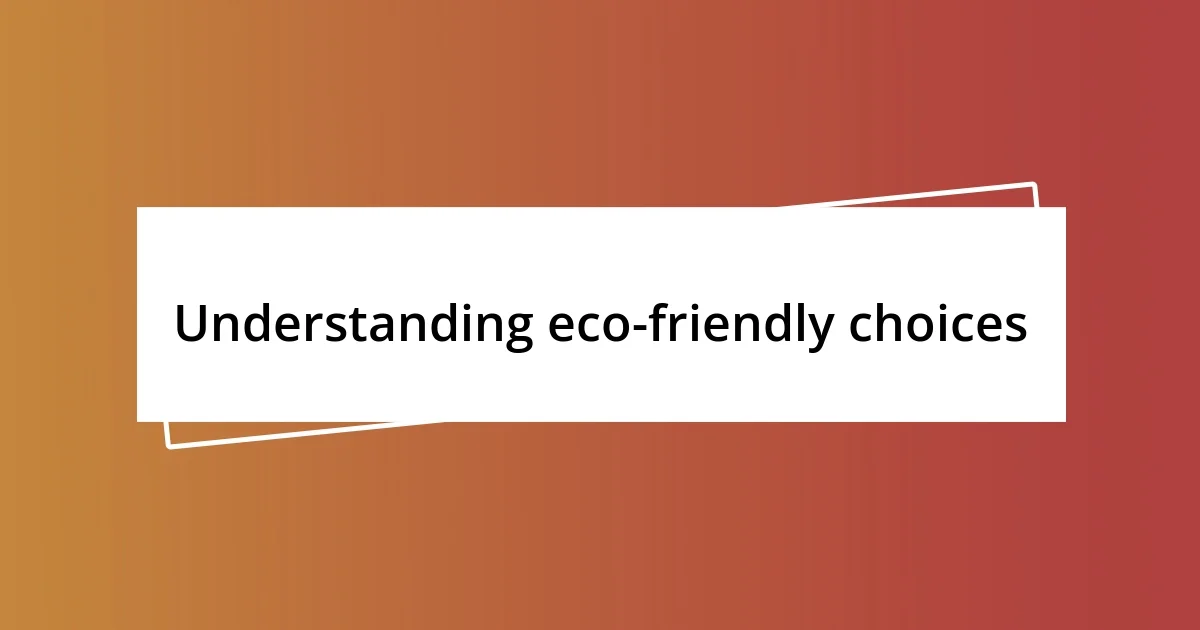
Understanding eco-friendly choices
Understanding eco-friendly choices starts with recognizing the impact our daily decisions have on the environment. I’ll never forget the first time I switched to a reusable water bottle; it felt like such a small decision, yet each time I used it, I felt a sense of pride knowing I was reducing plastic waste. Isn’t it empowering to think that our simple choices can collectively make a substantial difference?
When diving deeper into eco-friendly practices, I often grapple with the chance of feeling overwhelmed by all the options available. For instance, I remember standing in a grocery store aisle, staring at countless sustainable products and wondering, “Which is actually better for the planet?” This moment of uncertainty reminded me that eco-friendly choices don’t need to be perfect; they just need to be intentional and informed.
Moreover, understanding what sustainability truly means has transformed my perspective. It’s not merely about reducing waste; it’s also about embracing a mindset that prioritizes longevity and quality over quantity. I’ve found joy in selecting products that not only serve a purpose but also respect our planet, and that’s where the real magic lies. Have you ever felt a connection to an object because you knew it was made with care for the Earth? That feeling is deeply rewarding.
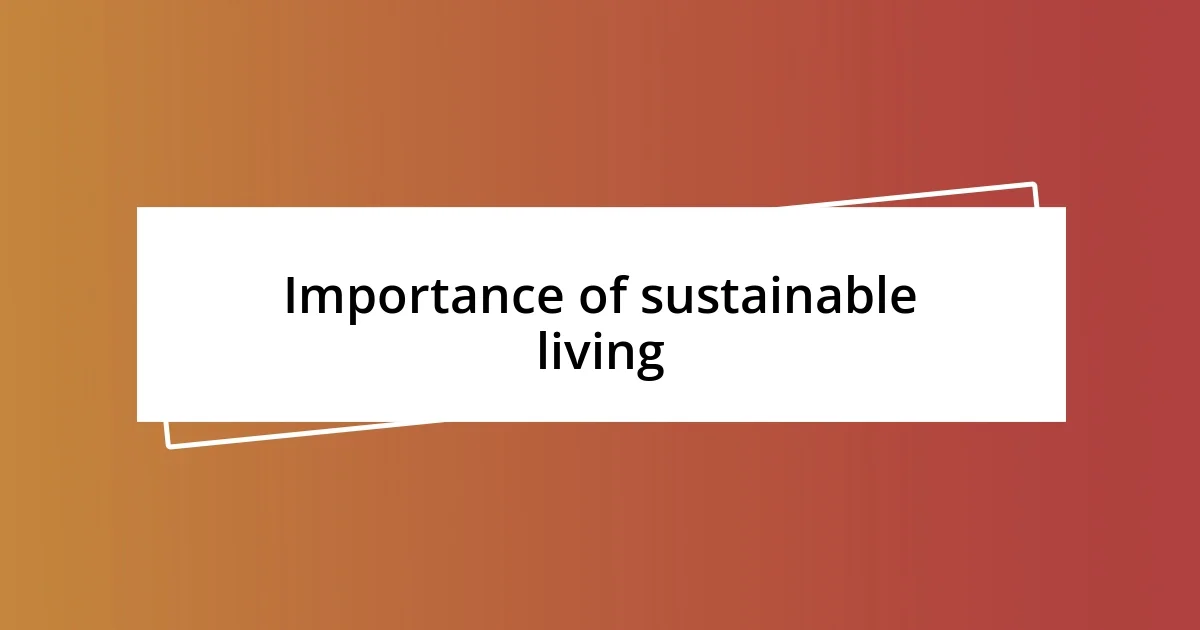
Importance of sustainable living
Sustainable living is crucial because it fosters a healthy environment for future generations. When I made the shift to using biodegradable cleaning products, it felt like I was not just making a choice for myself but also for the children of my family. I remember seeing my niece curiously sniffing the floor cleaner as I explained how it wouldn’t harm her if she accidentally touched it. That moment reinforced my belief in the importance of making safe, eco-friendly choices that protect our loved ones and the planet.
Moreover, sustainable living promotes a sense of community and global responsibility. I often participate in local clean-up efforts, and each event feels like a mini-reunion filled with like-minded individuals who share the same ideals. As we work side by side picking up trash from our local parks, I feel a powerful connection to my community. It reminds me that sustainable choices aren’t just individual actions; they create a ripple effect that inspires others to join in the movement towards better environmental stewardship.
Lastly, embracing sustainability leads to a more mindful and fulfilling lifestyle. Transitioning to a zero-waste lifestyle, for example, has made me more aware of my consumption habits. I’ve learned to love experiences over material possessions. A simple hiking trip with friends now feels more enriching than any shopping spree ever could. Doesn’t it make you wonder how different our lives could be if we prioritized sustainability in every aspect?
| Key Aspect | Importance |
|---|---|
| Environmental Protection | Prevents degradation and preserves natural resources |
| Health and Safety | Reduces exposure to harmful chemicals |
| Community Engagement | Brings people together for a common cause |
| Mindful Living | Encourages intentional consumption habits |
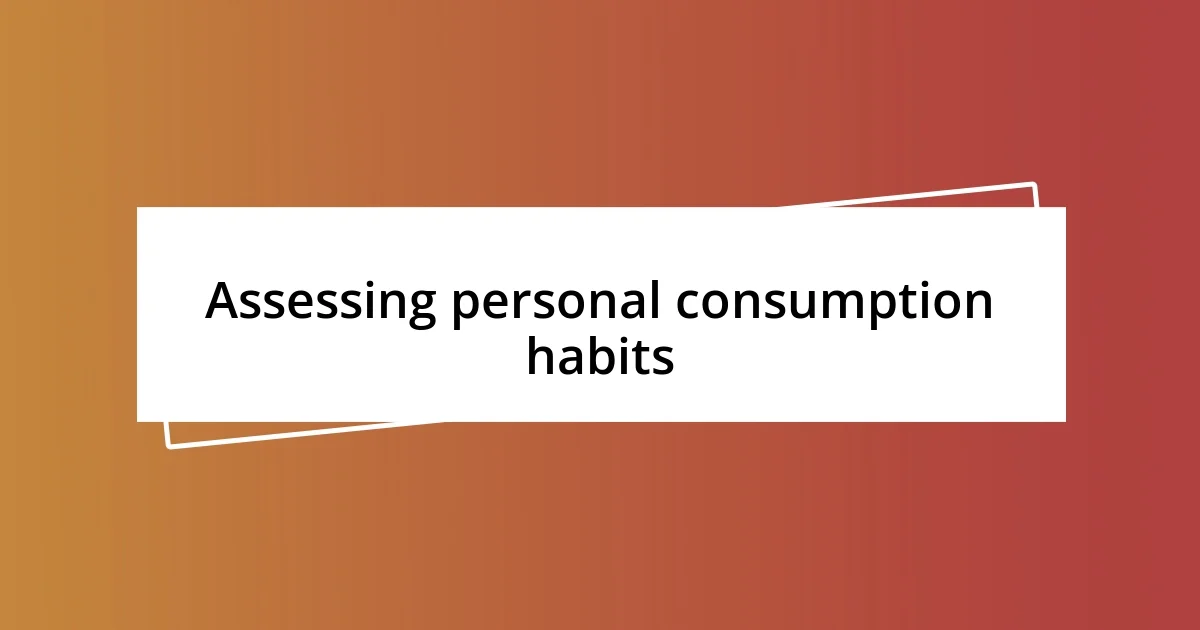
Assessing personal consumption habits
Assessing my personal consumption habits has been an eye-opening journey. I used to shop impulsively, often drawn in by flashy marketing. But after reflecting on my choices, I began to notice how many products I bought that I really didn’t need. Now, before making a purchase, I ask myself: “Will this item add value to my life or just clutter my space?” This simple question has made all the difference in how I view my consumption.
Here are a few key considerations that guide my assessment process:
- Frequency of purchases: How often do I buy similar products? Can I reduce this?
- Product longevity: Is this item built to last, or will I need to replace it soon?
- Ethical sourcing: Where does this product come from? Is it sourced responsibly or harming the environment?
- Personal fulfillment: Does this purchase bring me joy or satisfaction, or is it just a momentary thrill?
I find that this reflective process not only curbs unnecessary spending but also allows me to connect more deeply with the items I choose to bring into my life. Each conscious choice feels like an act of self-care, reinforcing a lifestyle that values quality and sustainability over quantity.
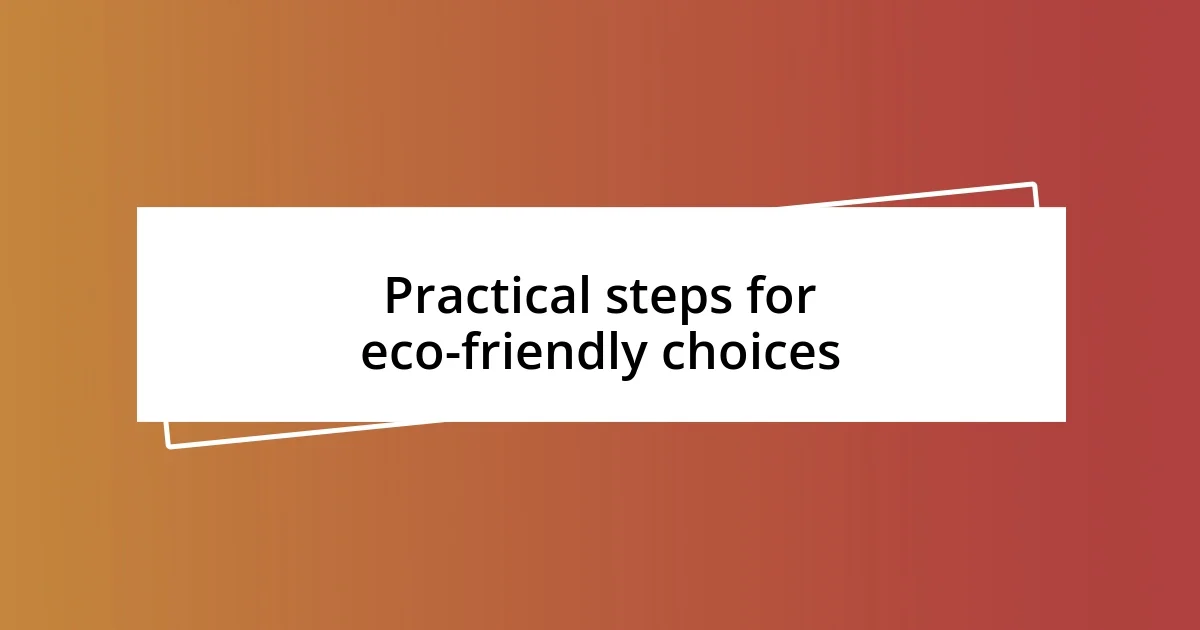
Practical steps for eco-friendly choices
Making eco-friendly choices starts with small, actionable steps that can lead to significant impact over time. I remember the first time I decided to switch to reusable shopping bags. Initially, it was a bit inconvenient, but now I can’t imagine going back to plastic. Every time I pull out a bright, sturdy bag from my car, I feel a sense of pride, knowing I’m reducing waste one trip at a time. Have you ever felt that rush of satisfaction from making a better choice?
Another practical step I’ve found impactful is meal planning. Years ago, I started organizing my week’s meals ahead of time, and it truly transformed my relationship with food. By buying only what I need, I’ve significantly cut down on food waste. Plus, I save money in the process! I often find myself savoring each bite more because I’ve put thought into what I’m eating, creating an experience rather than just a meal. How often do we take a moment to appreciate the food on our plate?
One effective eco-friendly choice is switching to a sustainable energy provider. When I made the switch, I was surprised by how easy it was. I remember feeling a weight lift off my shoulders as I realized I was directly supporting clean energy sources. It’s a profound feeling to know that my electricity is being sourced from wind or solar power rather than fossil fuels. Have you checked if renewable options are available in your area? Sometimes it just takes a little research to make a big difference in how we contribute to a healthier planet.
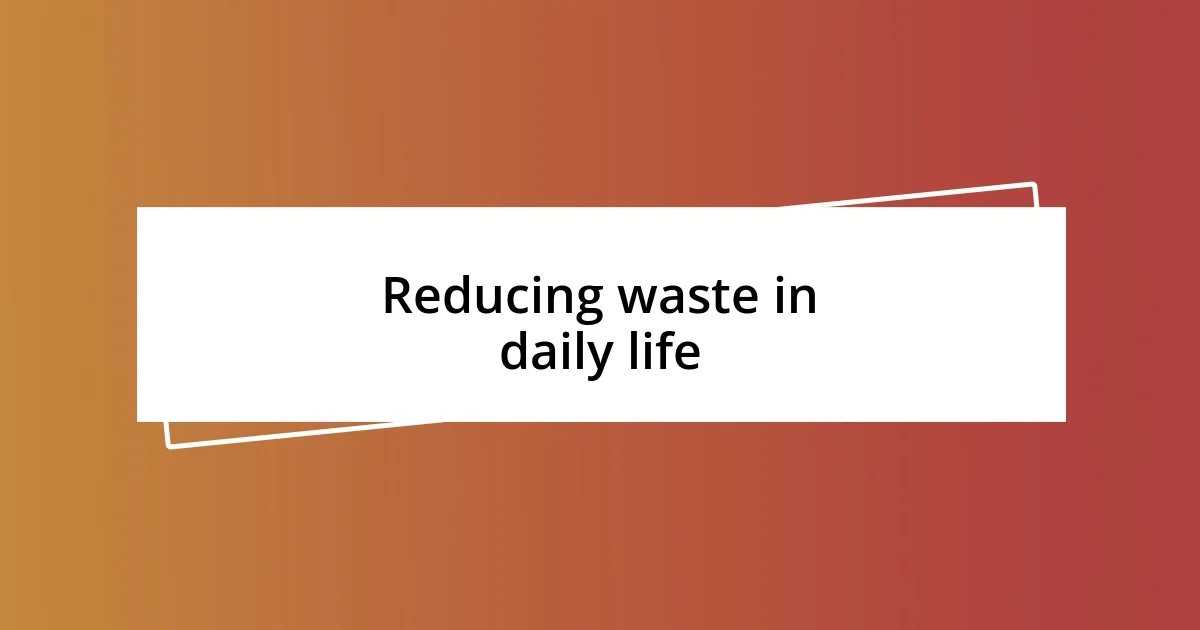
Reducing waste in daily life
Reducing waste in daily life has become second nature for me after committing to greener habits. A simple shift that made a huge difference was when I started carrying a reusable water bottle everywhere I went. I vividly remember the days of buying single-use plastic bottles—each one feeling like a small betrayal to my eco-conscious journey. Now, every sip from my stainless-steel bottle reminds me of my dedication to reducing plastic waste. Have you ever considered how easy it is to make one small switch?
I also embraced minimalism in my kitchen, which has transformed how I view food and waste. By using glass containers for food storage instead of plastic wrap, I not only minimized waste but also prioritized my health. I can still recall the moment I opened my fridge and was met with vibrant fruits and vegetables neatly stored—no more limp produce stuck in a plastic bag! It reignited my passion for cooking and making the most of what I have. Isn’t it amazing how reducing waste can lead to a more enjoyable kitchen experience?
Another step I took was initiating a composting system in my backyard, which has been incredibly rewarding. Initially, I felt overwhelmed by the thought of separating scraps, but now, it’s become a soothing routine. There’s something deeply satisfying about turning food waste into nutrient-rich soil. It’s like giving back to nature while reducing what ends up in the landfill. Have you ever felt that deep connection to the Earth when you nurture something from your waste?
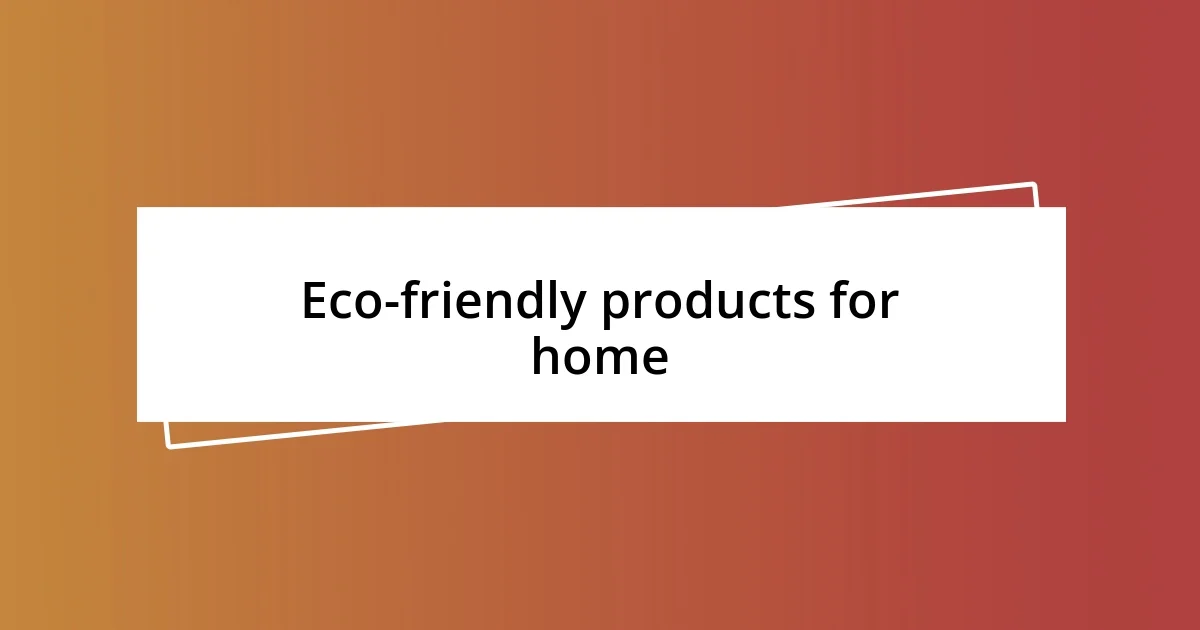
Eco-friendly products for home
When it comes to eco-friendly products for my home, I truly see my choices as an extension of my values. One of my favorite recent purchases was biodegradable cleaning supplies. The first time I used a plant-based all-purpose cleaner, I remember being pleasantly surprised by its effectiveness. The fresh scent wasn’t just a nice bonus; it felt right to know that I was cleaning my home without releasing harsh chemicals into the environment. Have you ever considered how your cleaning products affect the air quality in your own home?
Another change that brought me joy was switching to bamboo toothbrushes. I’ll never forget the first time I opened my bathroom cabinet to find a row of sleek, natural toothbrushes staring back at me. It was like a little reminder of my commitment to reducing plastic waste each morning. These bamboo brushes not only feel good to use, but the knowledge that they’re compostable adds a layer of satisfaction. Isn’t it fascinating how something as simple as a toothbrush can contribute to a larger eco-friendly lifestyle?
I also made my kitchen greener by investing in beeswax wraps instead of plastic wrap. Initially, I wasn’t sure how well they would work, but I fell in love with the vibrant patterns as soon as I unwrapped them. I still remember my astonishment when I realized they not only kept food fresh but also sparked conversations during dinner parties. Friends would ask me about them, and it felt great to share my journey towards sustainability. Have you thought about how shifting to eco-friendly kitchen products can change not only your routine but also inspire those around you?
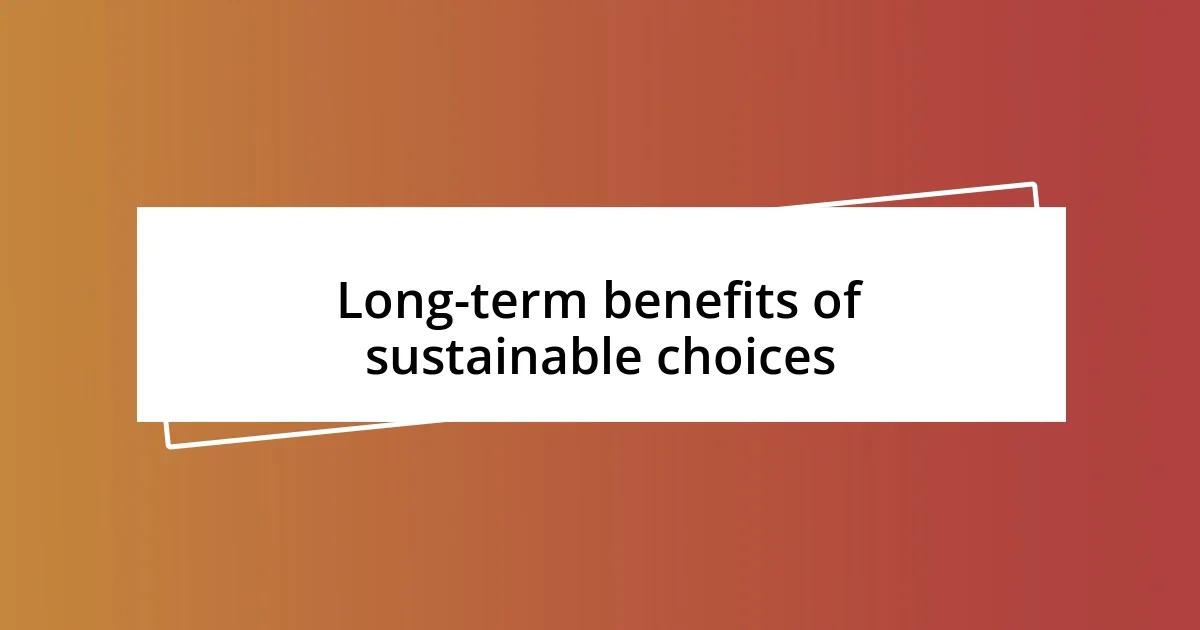
Long-term benefits of sustainable choices
Sustainable choices offer more than just immediate benefits; they pave the way for a healthier future. I often reflect on how my decision to invest in energy-efficient appliances has not only decreased my utility bills but also lessened my carbon footprint. It’s rewarding to think about how each time I use my efficient washing machine, I’m conserving energy and water while doing my part to combat climate change. Have you ever calculated the savings you could enjoy while helping the planet?
Another long-term benefit I’ve personally experienced is the enhanced quality of life. Since I switched to a plant-based diet, I’ve noticed a significant uptick in my energy levels and overall well-being. The vibrant colors of fresh produce in my pantry not only brighten my kitchen but also serve as a constant reminder of how my choices directly impact my health and the environment. Is it surprising that what we eat can transform our lives?
Investing in sustainable choices also cultivates a sense of community. I remember attending a local farmer’s market for the first time and feeling an overwhelming sense of connection with my neighbors and local producers. It was not just about buying organic vegetables; it was about supporting those committed to sustainable practices. The conversations we shared about growing methods and seasonal produce deepened my appreciation for local agriculture. Have you ever considered how supporting local businesses contributes to a larger movement toward sustainability?

